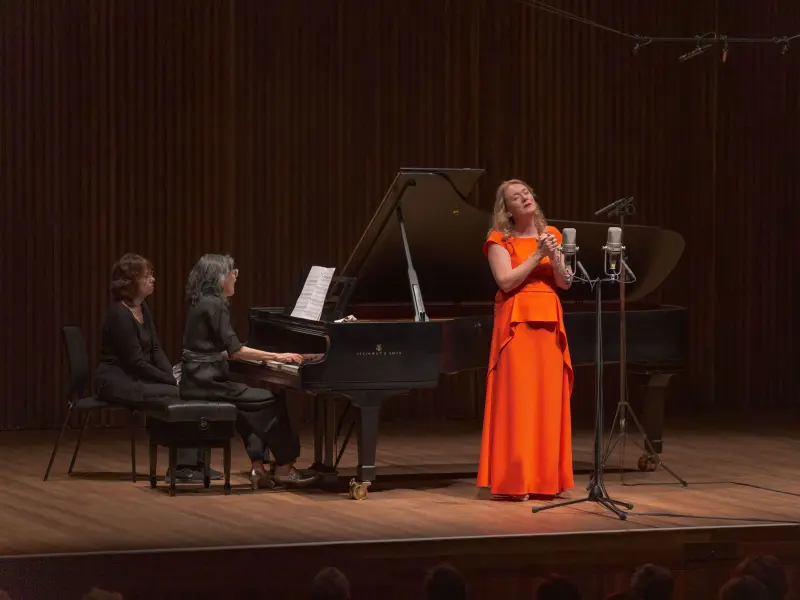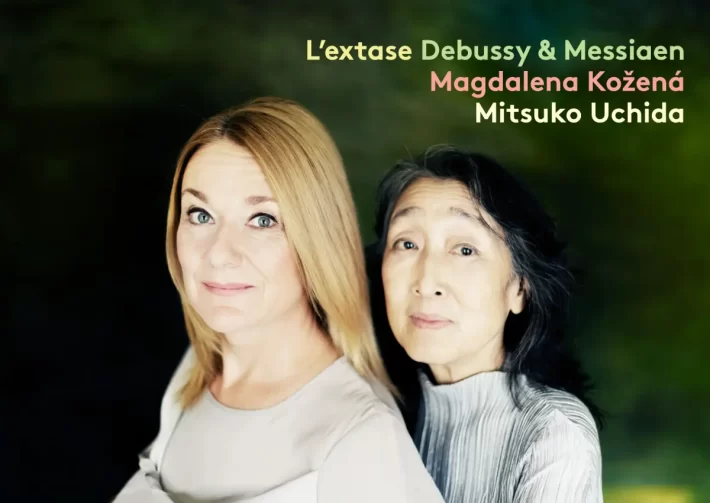In their recent collaborative project, mezzo-soprano Magdalena Kožená and pianist Mitsuko Uchida present songs by Claude Debussy and one of his greatest admirers, Olivier Messiaen. Kožená boasts a wide discography ranging from Monteverdi to Martinů, and her recording of Pelléas et Mélisande with Charles Dutoit already highlighted her affinity for Debussy. Uchida, meanwhile, has performed Messiaen’s Oiseaux Exotiques under the batons of Simon Rattle and Andris Nelsons, and her recording of Debussy’s Études is among the most celebrated.

Debussy’s songs often seem fleeting, but they offer such lustrous harmonies that transport listeners to a different world. Trois Chansons de Bilitis perfectly exemplifies this, combining sensitivity with musical intimacy. In La Flûte de Pan (track 1), Uchida beautifully captures the piano textures that mimic flute playing—not with casual ease, but with ideal fluidity. This complements Kožená’s voice, whose rich mezzo timbre intriguingly contrasts with Debussy’s ethereal textures. The result differs notably from other interpretations, such as soprano Ruby Hughes’s 2024 recording accompanied by string quartet, whose brighter voice lends the song a distinctly different character.
In La Chevelure (track 2), the soundscape expands dramatically. Uchida wisely avoids excessive heaviness in the bass, instead providing just enough resonance and depth. Meanwhile, Kožená gradually intensifies her vocal line, creating a powerful swell that fully captures the ecstatic character implied by the album’s title.
The Cinq Poèmes de Charles Baudelaire set is, in some ways, more outwardly expressive than the Chansons de Bilitis. In Le Balcon (track 4), Kožená convincingly conveys a sense of yearning, although she occasionally sounds slightly strained in higher registers. Yet the overall impression of ecstatic anticipation remains undiminished. The whole-tone harmonies of Harmonie du soir (track 2) introduce mystery to an otherwise warm tonality. As the piece progresses, Debussy’s adventurous tonal and textural shifts are brilliantly captured. Uchida’s glittering arpeggios and cascading chords pair exquisitely with Kožená’s attentive harmonic nuances.
While most of the Ariettes oubliées are subtler, this does not diminish their impact. Indeed, this set showcases the duo’s finest nuanced communication and personalized sonic landscapes. L’ombre des arbres (track 12) evokes a similar sinister, lurking quality found in Debussy’s prelude Feuilles mortes from Book II—never disturbing the peace but continuously threatening it. Kožená is expressively compelling in this restrained context, yet Uchida’s tonal control truly captures the unsettling mood. Green (track 13) is superbly vibrant, Kožená’s ebullience balancing beautifully with the tenderness of the text, and Uchida effortlessly conjures vivid water imagery ranging from delicate droplets to vigorous sprays.

Magdalena Kožená and Mitsuko Uchida (image: ©️ Matt-Jolly)
The Debussy selections are followed by an equally strong interpretation of Messiaen’s second book of Poèmes pour Mi. Kožená’s sharper timbre in higher registers proves highly effective, emphasizing the plaintive intensity in L’épouse (track 15) and the fierce power of Les deux guerriers (track 17). Uchida, consistently attentive, adds a mysterious and otherworldly quality through Messiaen’s signature tone clusters.
Complemented by concise yet informative liner notes and complete text translations, L’extase is a rewarding album that invites repeated listening.

Album Details |
|
|---|---|
| Album name | L’extase |
| Label | Pentatone |
| Catalogue No. | 4870959 |
| Artists | Magdalena Kožená (mezzo-soprano) Mitsuko Uchida (piano) |


















